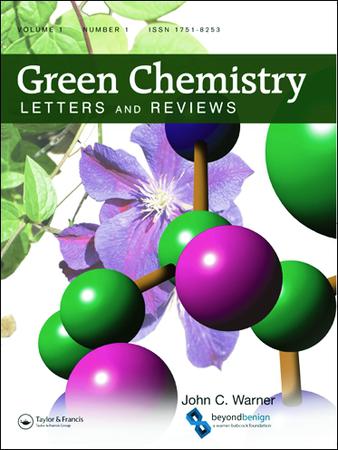基于木质素磺酸盐包覆银纳米颗粒的视觉比色法测定汞(II)
IF 5.8
3区 化学
Q1 CHEMISTRY, MULTIDISCIPLINARY
引用次数: 2
摘要
本文章由计算机程序翻译,如有差异,请以英文原文为准。
Visual and colorimetric determination of mercury (II) based on lignosulfonate-capped silver nanoparticles
ABSTRACT
Lignosulfonate /silver nanoparticles (L–AgNPs) were synthesized by a one-pot method. The structure of the prepared L–AgNPs was characterized by ultraviolet–visible spectroscopy, Fourier transform infrared spectroscopy, transmission electron microscopy, X-ray diffraction, and X-ray photoelectron spectroscopy. The prepared L–AgNPs were spherical with a size of approximately 16–22 nm, whereas the structure of lignosulfonate did not change during the synthesis. The synthetic method is green, simple and fast. As a heavy metal, establishing a green and rapid detection method for mercury ion is very important. L–AgNPs exhibited high selectivity for mercury (II), a detection range of 0–68 µM, and a minimum detection limit of 7 nM. The detection method developed in this work was used for the determination of mercury (II) in actual water samples, and the results agreed well with those obtained by a colorimetric method. This study provides a new idea for the practice of green chemistry and a novel method for the detection of mercury (II). GRAPHICAL ABSTRACT
求助全文
通过发布文献求助,成功后即可免费获取论文全文。
去求助
来源期刊

Green Chemistry Letters and Reviews
CHEMISTRY, MULTIDISCIPLINARY-GREEN & SUSTAINABLE SCIENCE & TECHNOLOGY
CiteScore
9.10
自引率
3.00%
发文量
48
期刊介绍:
Green Chemistry Letters and Reviews is an Open Access, peer-reviewed journal focused on rapid publication of innovative new syntheses and procedures that reduce or eliminate the use and generation of hazardous materials. Reviews of state-of-the-art green chemistry technologies are also included within the journal''s scope.
Green Chemistry Letters and Reviews is divided into three overlapping topic areas: research, education, and industrial implementation. The journal publishes both letters, which concisely communicate the most time-sensitive results, and reviews, which aid researchers in understanding the state of science on important green chemistry topics. Submissions are encouraged which apply the 12 principles of green chemistry to:
-Green Chemistry Education-
Synthetic Reaction Pathways-
Research and Process Analytical Techniques-
Separation and Purification Technologies-
Renewable Feedstocks-
Degradable Products
 求助内容:
求助内容: 应助结果提醒方式:
应助结果提醒方式:


